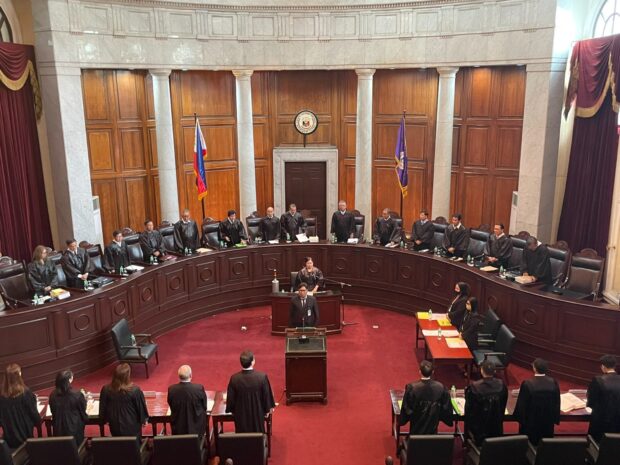
The Supreme Court is in session to hear the government’s plea to reverse a Malabon Court’s ruling against Fishing administrative order that is causing losses in Philippine exports and decline of fishing grounds. | PHOTO: SC PIO
MANILA, Philippines — Government lawyers urged the Supreme Court to reverse the decision of the Malabon Regional Trial Court, nullifying the Fisheries Administrative Order (FAO) 266 as the country could lose billions worth of fishing exports.
FAO 266 is a regulatory measure that implements the Vessel Monitoring System and Electronic Reporting System, which was enacted to comply with the implementation of various conservation and management measures under the Regional Fisheries Management Organizations and other International Fisheries Commissions, of which the Philippines is a signatory.
While the order was issued for the purpose of fighting illegal fishing, commercial fishing companies believed that the information to be recorded and reported— such as the position of the vessel where the fish was caught and the date and time of vessel activity — were sensitive information and part of their trade secrets and proprietary information.
During Tuesday’s oral argument, Solicitor General Menardo Guevarra said the country’s fishing grounds have declined because the government can no longer monitor the fishing pressure on every ground.
With the Malabon court’s ruling, Guevarra said the government “is left defenseless against the decline and deterioration of the country’s marine resources and ineffective in the enforcement of the right of the people for imbalance and helpful ecology. It stands to suffer economically for failure to comply with the traceability requirements of countries to which our fisheries products are exported.”
He added that US320 million worth of fish products bound for Europe every year are also in danger of being rejected if the Philippine government fails to certify that such fish products were not caught through illegal, unregulated, and unreported fishing (IUUF).
“A declaration of unconstitutionality of FAO 266 frustrates the State’s efforts to honor its international commitments and render it powerless to uphold the shared goals these commitments represent…For failure to honor such commitments, the country may lose access to foreign markets for its fish exports,” he said.
He said in 2021, the value of Philippine exports of fishing products is worth around US$ 1 billion but has significantly declined over the years.
Through FAO 266, fishing vessels report their catches through a vessel monitoring system (VMS) and an electronic reporting system (ERS) in order to curb IUUF. Guevarra said both VMS and ERS are tools that aid state implementors to monitor all duly registered commercial fishing vessels to ensure that they are operating within authorized fishing grounds and guide them in the prosecution of violators of fisheries law.
READ: OSG to BFAR: Follow court decision on unconstitutionality of monitoring systems
He added that VMS and ERS are recognized globally.
The lead government counsel denied claims of respondent commercial fishing companies that FAO 266 violates their right to equal protection of the law and is tantamount to a deprivation of life, liberty, or property under the Constitution.
He said a fishing vessel’s fishing area, fish catches and spoilage, landing points, and estimated quantity and value of fish caught have long been required to be recorded and reported to BFAR upon the completion of its fishing trips.
He added that the respondents have no basis for claiming illegal intrusion into their fishing activities and unlawful search of data since FAO 266 merely seeks “to digitize and report in real-time” their activities.
Guevarra added that the Regional Trial Court also committed “jurisdictional trespass” when it ruled that FAO 266 is unconstitutional.
READ: Fishing firms want BFAR, NTC cited for contempt for defying court order
“A Regional Trial Court arrogated upon itself a power reserved exclusively to this honorable court, with grave abuse of discretion amounting to lack or excess of jurisdiction, issued a temporary restraining order and writ of preliminary injunction against the enforcement of fisheries laws without an indubitable legal basis to do so,” Guevarra said adding that the SC should rule on the matter in order “to guide the Bench, the Bar and the public in future environmental cases that may arise.”
The OSG represents the Department of Agriculture, BFAR, the National Telecommunications Commission, and Oceana Philippines International.
Named respondents were commercial fishing operators such as the Royale Fishing Corporation, Bonanza Fishing and Market Resources Inc., and RBL Fishing Corporation.
The oral argument will continue on November 21.